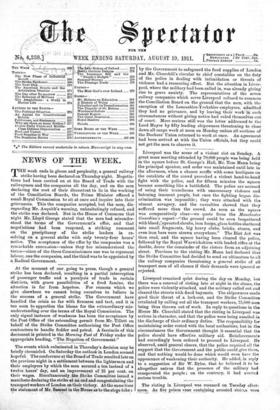The events which culminated in Thursday's decision may be briefly
chronicled. On Saturday the outlook in London seemed hopeful. The conference at the Board of Trade resulted late on the previous night in a settlement between the lightermen and their employers by which the men secured a ten instead of a twelve hours' day, and an improvement of 25 per cent. on their wages. Simultaneously the Strike Committee issued a manifesto declaring the strike at an end and congratulating the transport workers of London on their victory. At the same time the statement of Mr. Samuel in the House as to the steps take a • POSTAGE ABROAD by the Government to safeguard the food supplies of London and Mr. Churchill's circular to chief constables on the duty of the police in dealing with intimidation or threats of violence had a reassuring effect. But the situation in Liver-, pool, where the military had been called in, was already giving rise to grave anxiety. The representatives of the seven railway companies which serve Liverpool refused to summon the Conciliation Board on the ground that the men, with the exception of the Lancashire-Yorkshire employees, admitted they had no grievance, and by leaving their work in such circumstances without giving notice had ruled themselves out of court. More serious still was the letter addressed to the Lord Mayor by fifty leading shipowners threatening to close down all cargo work at noon on Monday unless all sections of the Dockers' Union returned to work at once. An agreement had been arrived at with the Union officials, but they could not get the men to observe it.


































